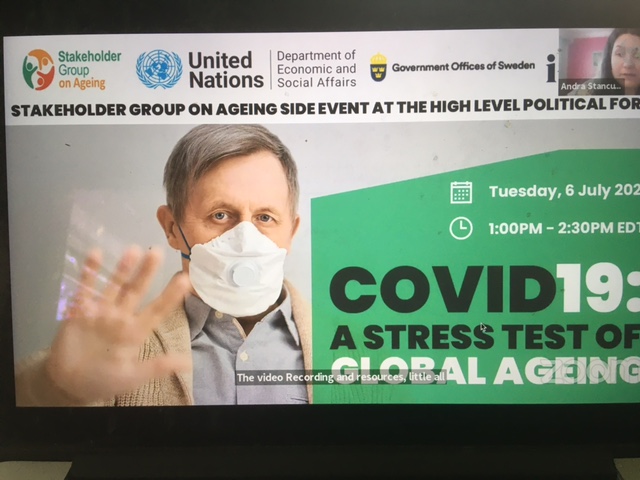6th July 2021
The Stakeholder Group on Ageing organized a side event at the HLPF about the COVID-19 pandemic and its effect on governmental policymaking for older persons. The panelists also discussed how older persons can increase their political leverage and combat ageism.

On 6 July 2021, the Stakeholder Group on Ageing (“SGA”) organized the United Nations High-Level Political Forum side event titled “COVID-19 Pandemic: A Stress Test of Global Ageing”. The International Longevity Center Global Alliance is a founding member of the SGA.
This event was moderated by Jane Barratt, Secretary-General, International Federation of Ageing and chaired by Ms. Erica Dhar, co-chair of the SGA and Director of Global Alliances and Advocacy with AARP’s Office of International Affairs.
In this side event, panelists discussed how the COVID-19 pandemic has revealed which of the Member States are best equipped to safeguard the rights of older persons. Furthermore, the speakers talked about how the pandemic has displayed a prevalent ageist attitude among many societies and governments.
This panel included distinguished international experts with a variety of perspectives and areas of expertise, as shown below:
- Keynote Address – Prof. Andrew Scott, Professor of Economics, London Business School
- Remarks – H.E. Ms. Barbro Westerholm, Member of Parliament, Sweden
- Panelist – Dr. Ad van Berlo, Chief Executive Officer and R&D Manager, Smart Homes
- Panelist – Ms. Aura Sevilla, Programme Consultant for South East Asia and Older Workers, Women in Informal Employment: Globalizing and Organizing (WIEGO)
- Panelist – Ms. Grace Chan, Business Director, Hong Kong Council of Social Service
- Special Respondent – Mr. Steve S. J. Lee, Organizing Partner, Major Group for Children and Youth
- Closing Remarks – Ms. Amal Abou Rafeh, Chief of the Programme on Ageing Unit, United Nations Department of Economic and Social Affairs (UN DESA)
Professor Scott’s keynote speech examined the changing narrative of governmental social policy during the pandemic, specifically that health has begun to take priority over GDP growth. This phenomenon has occurred due to both the effects of the pandemic and recent increases in life expectancy. Professor Scott argues that governments are being forced to confront that a large share of their population now consists of older persons and that more must be done to improve their quality of life. He suggests that the next step is for governments to focus on healthy life expectancy and standard of living, as well as being preemptive when it comes to potential issues like another pandemic.
During the Q&A session, one issue of particular prominence was how individuals could convince governments and politicians to focus on the issues of older persons? A participant from South East Asia argued that, due to the typically high voter turnout of older persons, this should be a point of leverage against politicians who ought to be representative of the voting populace. On a similar note, an attendee from Canada pointed out that it is vital to combat implicit ageism in government and hold officials to their word.
The side event closed with Dr. Barratt thanking all of the participants for their contributions and thanking the sponsors for their assistance.
For the complete video recording of this event, please visit: https://media.un.org/en/asset/k1h/k1h5d696vx
Author: Sebastian Hartley, student volunteer for the ILC Global Alliance
Dynamic knowledge synthesis in local networks for coherent elderly care
We are getting older and more diverse, and that brings challenges. We cannot solve these challenges through healthcare alone. We also need municipalities, schools, companies, housing associations and older people themselves to achieve an age-friendly society. This requires cross-domain collaboration. But how can we achieve that?
25 April 2024
Event summary – Healthy ageing and longevity in Europe: How do we prepare for the 100-year life?
In partnership with ILC-UK, the ILC Europe Network hosted its inaugural conference in Brussels on 6 March 2024 to explore the challenges and opportunities associated with an ageing European society. Other ILC Global Alliance members in attendance included ILC-Czech Republic, ILC-France and ILC-Netherlands.
March 2024
White paper Arts in Health in the Netherlands: Art deserves a prominent place in healthcare
Much more attention needs to be paid to the positive effects of the use of art in healthcare. Art makes people feel better and helps them to better cope with their illness. Art can also mean a lot in the social domain and prevention, and in shortening hospital admissions.
February 2024


